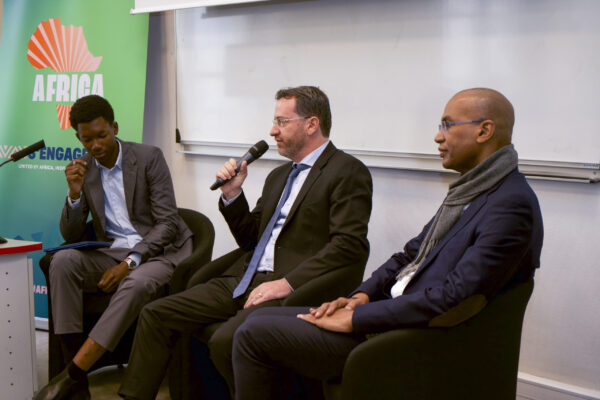As African trade intensifies, Central Africa emerges as a key link in global exchanges. At the heart of this dynamic, Cameroon stands out for the modernization of its ports, the growth of air freight, and the strengthening of maritime security. These issues were highlighted during Africa Day 2025 at Sciences Po Paris, where experts and economic actors emphasized that the country’s competitiveness will depend on its ability to combine innovation, local anchoring, and reliability. Cameroonian ports and airports at the heart of exchanges On October 4, PortSec, a company specializing in securing critical infrastructure, participated in the second edition of Africa Day, an international event dedicated to African successes. Through a panel dedicated to careers in infrastructure and the Talent Fair, a recruitment and exchange event between companies and students, the company shared its experience in securing ports and airports, emphasizing the importance of an African security model based on training and innovation.
During the panel on careers in infrastructure, discussions focused on the essential drivers of logistics competitiveness in Africa. “Infrastructure is not just a matter of engineering, it’s a matter of trust. When a port or airport is secure, the entire economic chain becomes more efficient,” reminded Tzafir Tzvi, CEO of PortSec, alongside Serge Agnero, Regional Managing Director Africa Global Logistics. Both emphasized a clear observation: the continent’s logistics competitiveness now relies as much on security as on modernization. The company, specialized in securing critical infrastructure, has established itself over the years as a key player in Central Africa. Its presence in Paris illustrates a fundamental trend: security is no longer a peripheral issue, but a pillar of African growth, an essential condition for attracting investments and ensuring the smooth flow of exchanges. Security, a pillar of Cameroon’s logistics performance At the heart of this transformation, Cameroon asserts itself as a strategic link in regional exchanges.
The port of Douala, which accounts for nearly 70% of the country’s foreign trade, plays a vital role for Chad and the Central African Republic. The government has initiated the construction of a 1,000-meter bulk terminal for a cost of 282 billion FCFA, to streamline flows and meet international standards. Further south, the deep-water port of Kribi complements this system: in June 2025, CEVA Logistics, a global operator based in France, launched the construction of a 30,000 m² hub for the storage and export of agricultural and mining products, thus strengthening Cameroon’s positioning as a logistics corridor in the Gulf of Guinea. The aviation sector accompanies this dynamic. In 2024, the country’s airports welcomed 1.77 million passengers, an increase of 5.6%, and air freight grew by 9.4%, according to IATA, confirming the country’s growing importance in regional and international exchanges. This interconnection between maritime and air infrastructure is accompanied by a growing priority: security. The Gulf of Guinea remains one of the most exposed areas to maritime crime, accounting for nearly 30% of global incidents in 2023, according to the MICA Center. For Tzafir Tzvi, “Cameroon’s success lies in its ability to link technology to humans, to adapt international systems to local realities, and to train teams capable of ensuring their sustainability.” A vision shared by many actors present at Africa Day: securing flows is not a cost, but a condition of trust and competitiveness. PortSec’s participation in the Talent Fair, where its teams exchanged with students and young graduates on security and infrastructure professions, illustrated this approach. It symbolizes a strong message: the continent’s logistics future will rely on modern, interconnected, and secure infrastructure, but also on human skills capable of operating and perpetuating them.


